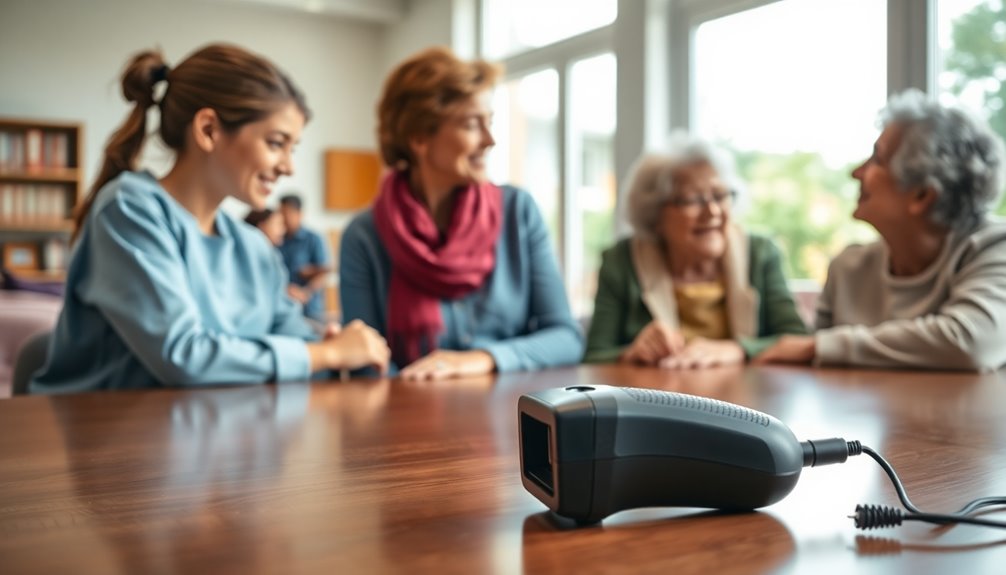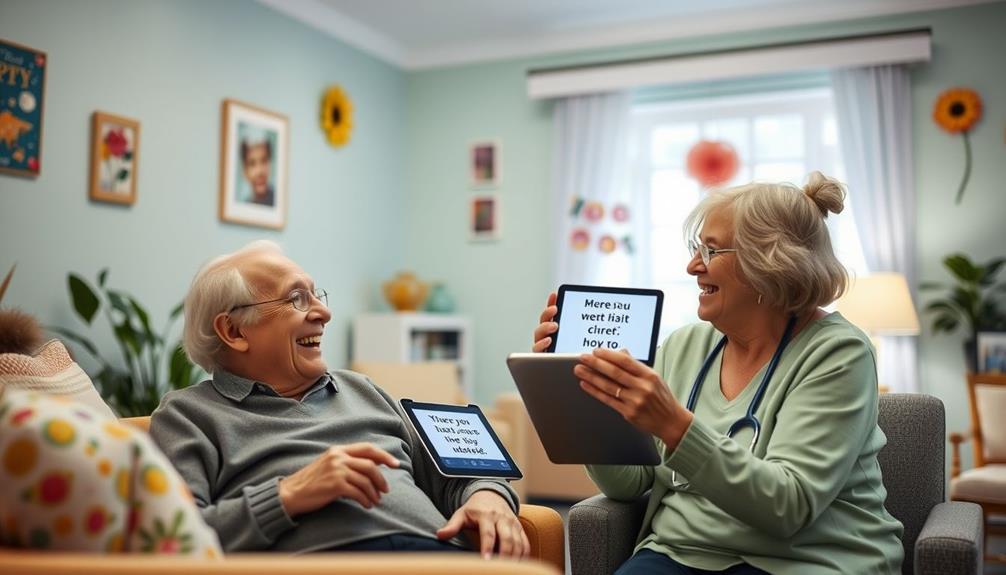To be a caregiver, you typically need to be at least 18 years old. However, some states, like Minnesota, allow caregivers as young as 16, provided they work for a licensed PCA provider. When you're younger, you'll face regulations and require regular monitoring by a Qualified Professional. It's vital to meet educational and training expectations for this role. If you're curious about the specifics, there's more valuable information ahead.
Key Takeaways
- The minimum age to become a caregiver is typically 18 years in most states.
- Some states, like Minnesota, allow caregivers as young as 16 with specific conditions.
- Caregivers aged 16-17 must work through a licensed PCA provider agency.
- Younger caregivers require monitoring by a Qualified Professional every 60 days.
- Compliance with labor laws is essential for younger caregivers regarding work hours and conditions.
Minimum Age Requirements for Caregivers

What's the minimum age to become a caregiver? Generally, the minimum age requirements for caregivers are set at 18 years.
However, some states allow caregivers as young as 16. For instance, in Minnesota, you can work as a paid caregiver for family members if you're at least 16.
If you're between 16 and 17, you must be employed by a licensed PCA provider agency and monitored by a Qualified Professional every 60 days.
It's essential to comply with labor laws, ensuring your working conditions and hours are appropriate.
Regardless of age, all caregivers need to pass a certification test and undergo a background check to guarantee the safety of those receiving care.
Education and Skill Level Expectations

Although becoming a caregiver can be a fulfilling career choice, it does come with specific education and skill level expectations. Typically, you need to be at least 18 years old, although some states allow 16-year-olds to serve in caregiving roles. A high school diploma or equivalent is generally required to guarantee you have basic literacy and math skills. Many caregiving positions may also require additional certifications or training, particularly for specialized roles such as working with the elderly or individuals with disabilities. If you’re interested in how to start a caregiving career, consider exploring community college courses or online programs that focus on essential caregiving skills. Additionally, gaining experience through volunteer work or internships can help you build valuable connections and enhance your resume in this rewarding field.
For specialized positions, more advanced education may be necessary. Completing a caregiver training program is important; these programs cover essential topics like first aid, healthcare plans, and medication management.
Additionally, you must demonstrate emotional maturity and stability, as these traits are imperative for effectively supporting vulnerable individuals in your care.
Understanding the Role of a Caregiver

As a caregiver, you take on a range of responsibilities that go beyond just physical tasks.
It's vital to understand the importance of proper training and the emotional support you provide to guarantee the well-being of those in your care.
Each aspect of your role contributes greatly to enhancing the quality of life for your care recipient.
Caregiver Responsibilities Explained
When you step into the role of a caregiver, you take on a range of responsibilities that are vital to the well-being of those you support.
Your caregiver responsibilities include assisting with personal care tasks like bathing, dressing, and grooming, tailored to each individual's needs.
You'll also need to address emotional and psychological aspects, offering empathy and understanding.
Physical ability is important, as you may have to lift or transfer individuals with mobility challenges.
Your focus should always be on promoting dignity, independence, and quality of life, helping those you care for remain in their own homes.
Importance of Caregiver Training
Caregiver training is essential for anyone stepping into this important role, as it equips you with the skills needed to provide effective support. Through these programs, you learn crucial skills in first aid, health care plans, and medication management, ensuring you can competently assist your care recipients.
Training also addresses the emotional and psychological needs of individuals with disabilities or chronic illnesses, fostering a holistic approach to caregiving. Earning a certification upon completing caregiver training validates your readiness to manage emergencies and ethical considerations in care.
Ongoing education is encouraged to keep you updated on new techniques, regulations, and best practices, ensuring that you remain a competent and responsible caregiver. Additionally, understanding the importance of regular dental visits can greatly enhance the overall well-being of those you care for.
Emotional Support in Caregiving
Training prepares you for the multifaceted role of caregiving, which extends beyond physical assistance to encompass emotional support. You'll recognize the importance of mental well-being in your care recipient's overall health and learn to respond to their emotional needs effectively. By offering companionship and actively listening, you can help alleviate feelings of isolation and anxiety. Understanding the potential for emotional abuse in relationships can further enhance your ability to support those in need.
Here's a quick overview of the emotional support aspects:
| Aspect | Description |
|---|---|
| Empathy | Understanding emotional needs |
| Companionship | Reducing feelings of isolation |
| Active Listening | Validating feelings and concerns |
| Emotional Resilience | Managing your own feelings |
| Holistic Support | Addressing both physical and emotional needs |
Through your training, you'll be equipped to provide the thorough emotional support your care recipients need.
Certification Training Programs for Aspiring Caregivers

To become an effective caregiver, you'll need to complete a specialized training program that equips you with essential skills.
These caregiver training programs typically cover important topics, ensuring you're fully prepared to support those in need. Here are three key areas you'll learn:
- Basic first aid: Understanding how to respond to emergencies is critical.
- Health care plans: You'll learn how to create and follow personalized care plans.
- Medication management: Properly administering and tracking medications is essential for safety.
Many programs also address the emotional and psychological needs of care recipients, fostering holistic care.
Upon completion, you'll often receive a certificate, validating your skills and enhancing your employability as a caregiver.
Competency Examinations: What to Expect

After completing your caregiver training program, the next step is to prepare for the competency examination. Each state has its own standards, so check your local requirements before diving in.
Generally, the competency exam assesses your knowledge and skills in areas like basic care, emergency procedures, record keeping, and ethical considerations. The format can vary; you might encounter multiple-choice questions, practical demonstrations, or a mix of both.
Passing this exam is essential for obtaining your professional caregiver certification, ensuring you meet the necessary standards for patient care.
To boost your readiness, review training materials and take practice tests provided by your program. This preparation will help you feel confident and ready to succeed in your competency examination.
Importance of Background Checks and Fingerprint Clearance

Background checks and fingerprint clearance play an essential role in ensuring the safety and well-being of those receiving care.
When you're considering a caregiver role, remember these key points about background checks:
- They verify the identity and criminal history of prospective caregivers.
- The electronic submission of fingerprints aids in eliminating hiring risks.
- Fingerprint clearance builds trust, especially with vulnerable individuals.
These rigorous screenings foster a safe environment for both caregivers and care recipients. Additionally, compliance with background check and fingerprint clearance requirements is often mandatory for obtaining caregiver certification in many states. This process is similar to the divorce process in that it ensures thorough verification before a significant commitment.
Basic Life Support and First Aid Training

As a caregiver, getting certified in Basic Life Support and First Aid is vital for your role.
This training not only equips you with essential emergency response skills but also involves hands-on workshops that provide practical experience.
Certification Importance
Certification in Basic Life Support (BLS) and First Aid is essential for caregivers, ensuring they can effectively respond to emergencies like breathing or cardiac issues.
This caregiver certification not only demonstrates your competence but also boosts your employability in the caregiving field.
Here's why it matters:
- Hands-on training: You gain practical skills for real-life scenarios, preparing you for emergencies.
- Injury management: You learn critical response techniques to handle various medical situations effectively.
- Confidence boost: Being certified enhances your ability to manage emergencies, ensuring the safety of those you care for.
Ultimately, BLS and First Aid training equips you to provide ideal care when it matters most, highlighting your commitment to safety and professionalism.
Emergency Response Skills
When you step into the role of a caregiver, having solid emergency response skills is essential for ensuring the safety and well-being of those you care for.
Certification in Basic Life Support (BLS) and First Aid isn't just a formality; it equips you to effectively handle breathing and cardiac emergencies.
Training programs focus on practical, hands-on learning, preparing you for real-life situations.
With BLS and First Aid certification, you showcase your ability to manage injuries and emergencies, which is vital for the safety of your care recipients.
Workshops included in your training help you practice these skills in a controlled environment, boosting your confidence.
These emergency response skills can also make you a more attractive candidate to potential employers.
Hands-On Training Experience
Hands-on training in Basic Life Support (BLS) and First Aid is essential for any caregiver. This training equips you to handle emergencies effectively, ensuring the safety of the care provided.
Here's what you'll gain from this experience:
- Certification: Completing BLS and First Aid training showcases your competence to potential employers.
- Confidence: You'll feel more assured in your ability to manage injuries and emergencies, which can save lives.
- Practical Skills: Training workshops offer simulated emergency scenarios, allowing you to practice responding to real-life situations.
Special Considerations for Young Caregivers

What unique challenges do young caregivers face? Young caregivers, often aged 16-17, must navigate specific regulations and monitoring. In Minnesota, they can only work through a PCA provider and are subject to strict labor laws to protect their welfare. Here's a quick overview:
| Consideration | Details |
|---|---|
| Minimum Age | 16 years old |
| Employment Requirement | Must be employed by one PCA provider |
| Monitoring | Every 60 days by Qualified Professionals |
| Labor Laws | Restrictions on hours and responsibilities |
| In-Person Evaluations | Mandatory to assess caregiving capabilities |
These factors can create stress, as young caregivers balance their responsibilities while ensuring they meet caregiving standards.
Ongoing Education and Training for Caregivers

As caregiving practices evolve, staying informed through ongoing education and training is essential for all caregivers. This not only helps you provide high-quality care but also keeps you compliant with state regulations.
Here are three key areas to focus on:
- Advanced Topics: Explore subjects like dementia care, mental health support, and assistive technologies to enhance your skills.
- Emotional Resilience: Attend workshops that teach stress management and self-care strategies, which are vital to prevent burnout.
- Flexible Learning: Utilize online resources and courses to complete your ongoing education at your own pace, making it easier to fit into your schedule. Additionally, understanding the emotional impact of caregiving can significantly improve the quality of support you provide.
Resources for Aspiring Caregivers

While stepping into the world of caregiving can be challenging, numerous resources are available to guide you through the process.
In Minnesota, if you're between 16 and 17, you'll need to work with a certified PCA provider agency and undergo monitoring by a Qualified Professional every 60 days. To show your competency, you must pass a standardized certification test, which is essential for aspiring caregivers.
Additionally, you'll find various training programs and certification assistance tailored specifically for young caregivers. These resources for aspiring caregivers will help you navigate labor laws and work hour requirements, ensuring you're fully prepared to begin your caregiving journey.
Don't hesitate to seek out these valuable tools to support your new role!
Frequently Asked Questions
Can You Be a Caregiver at 16 Years Old?
Yes, you can be a caregiver at 16 years old, but there are specific conditions you need to meet.
You'll have to pass a certification test and undergo a background study.
If you're working as a caregiver for family members, you must be employed by a single PCA provider agency.
Plus, a Qualified Professional will monitor your work every 60 days to guarantee you're meeting care standards and complying with labor laws.
What Are the Requirements to Be a Caregiver in Texas?
Imagine stepping into a world where caring for others is your calling.
To be a caregiver in Texas, you need a high school diploma or equivalent, and you must complete a caregiver training program that covers first aid and care management.
You'll also pass state-mandated competency exams, and don't forget the background check and fingerprint clearance to guarantee safety for those you'll care for.
It's a rewarding journey, so get started!
What Age Range Is a Caregiver?
When considering the age range for caregivers, it typically starts at 16 or 18 years, depending on the state.
If you're 16 or older, you might be eligible, but regulations can vary.
For instance, in some areas, younger caregivers need to work under supervision and meet specific criteria.
It's essential to check your local laws to understand the exact age requirements and any additional qualifications you'll need to fulfill.
How Old Are Most Caregivers?
Most caregivers are typically adults, often between 30 and 60 years old.
You'll find that the average age of family caregivers in the U.S. is around 49, with many juggling caregiving alongside other responsibilities.
Notably, about 25% of caregivers are actually 65 or older, showing that older adults play a significant role in providing care.
Conclusion
Becoming a caregiver is like planting a seed; it requires the right conditions to grow and thrive. While the minimum age to start varies, your passion and commitment can shape your journey. Embrace educational opportunities and training to nurture your skills. Remember, every caregiver's path is unique, and ongoing learning is key to blossoming in this rewarding role. So, whether you're just starting or further along, keep cultivating your knowledge and compassion to make a difference.









